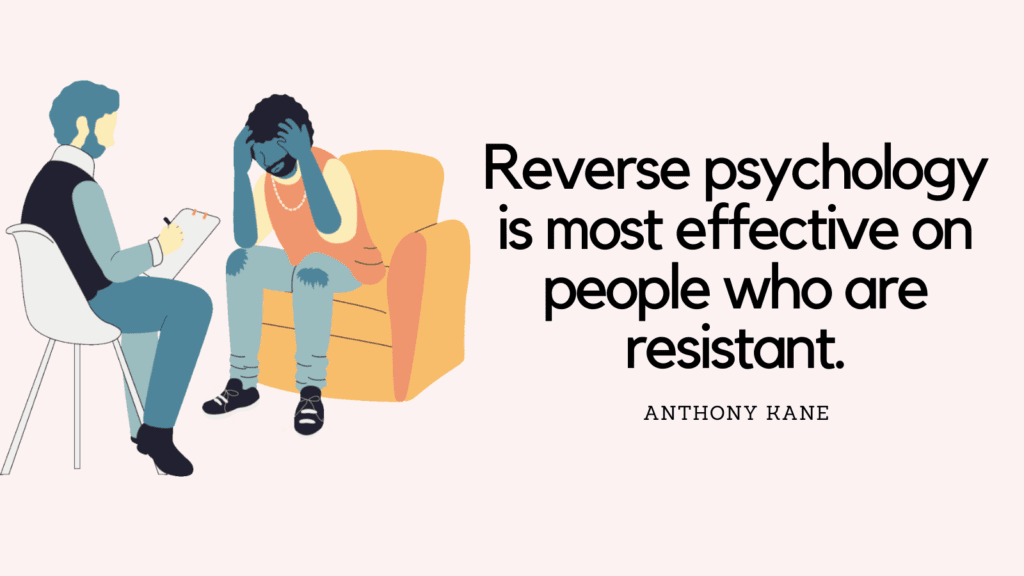This post contains some of the best reverse psychology quotes.
What Is Reverse Psychology?
Reverse psychology is a persuasion technique that involves advocating for a behavior that is opposite to the desired one.
Simply put, you say the opposite of what you want to encourage the other person to do what is actually desired.
Reverse Psychology Quotes
1. “Reverse psychology is a technique of persuasion where a speaker utilizes a behavior that is opposite to the change he wants to occur. It is practiced with the expectation that doing so will encourage the subject to do what they desire and this is the opposite of what is actually being suggested.” – Anthony Kane
2. “Reverse Psychology – Trying to get an individual to do the exact opposite of what you want them to do in an attempt to motivate them to do the direct opposite, which is what you wanted them to do in the first place.” – Shirley Reason
3. “Take the opposite direction. This is the heart of using reverse psychology. In fact, it is pretty much the dictionary definition of it.” – Katherine Shepard
4. “Reverse psychology relies on the reactance phenomenon, as discussed earlier, as it states that when there is a negative connotation to the action being persuaded, they will end up choosing the action which is forbidden” – Anthony Kane
5. “Reverse psychology is most effective on people who are resistant.” – Anthony Kane
“Reverse psychology should be used subtlety on people who are resistant to direct commands.” – Anthony Kane
6. “Scarcity Scarcity is often used as a reverse psychology technique. The Futurama episode where the new “must have” gizmo is allegedly in short supply but is actually available by the lorry load is often not far from the truth.” – Katherine Shepard
7. “Reverse psychology is often used with children because they are more vulnerable to reactance whenever there is a perceived threat to their freedom. It is a widely used practice in parenting, such as telling your children that you prefer they stay indoors when the actual desired outcome is for your children to go out and play.” – Anthony Kane
Related: What Causes Cognitive Distortions? (+Top 10 Common Cognitive Distortions & How To Challenge Them)
8. “Any parent can tell you that using reverse psychology works for almost any situation requiring a little extra boost in motivation for their child. It could be as simple as telling him that you want his vegetables at dinner or that you want to wear his shirt when he doesn’t get dressed, to as complex as packing his suitcase when he says he wants to run away. When used appropriately and cautiously, this form of reasoning works almost every time.” – Katherine Shepard
9. “I sometimes lie, especially about personal things, because what does it matter? I am a kind of minute commodity. My name is no longer my own. I try to lie as much as I can when I’m interviewed. It’s reverse psychology. I figure if you lie, they’ll print the truth.” — River Phoenix
10. “Reverse psychology is an awesome tool, I don’t know if you guys know about it, but basically you can make someone think the opposite of what you believe, and that tricks them into doing something stupid. Works like a charm.” — Steve Carell
11. “What is reverse psychology? Simply stated, it some form of mild manipulation that encourages someone to do the opposite of what he thinks you want him to. It is not only effective with children, but it can also be used in dating and relationships, business, and sales.” – Katherine Shepard
Related: How To Stop Self-Critical Thoughts Using These Top 10 Techniques
12. “You cannot beg your potential boyfriend or girlfriend to remain with you and then suddenly start using reverse psychology; this will not be effective in achieving your goals.” – Katherine Shepard
13. “It’s reverse psychology. I figure if you lie, they’ll print the truth.” — River Phoenix
14. “If you tell a child to eat his string beans, for instance, he will most likely flat out refuse. If you tell him not to eat his string beans because you want them more, he will probably eat every last one on his plate.” – Katherine Shepard
15. “While not always successful you will usually find that when you are faced with difficult situations and personalities, you are more likely to achieve desired results by using reverse psychology to achieve your goals as long as it is done gently and appropriately.” – Katherine Shepard
Related: How To Do Thought Work In 3 Simple Steps
16. “In business, using reverse psychology can be effective as well. Instead of asking an employee to perform a task he doesn’t want to do, try telling him that you know the task might be hard for him because he is too busy and that you are thinking of giving it to someone else. In this case, the employee will probably decide to accomplish the task because you have indirectly told him you do not think he can, and most adults do not want someone else to get credit for accomplishing work that was first offered to them.” – Katherine Shepard
17. “There are some important things to remember if you plan on using reverse psychology. The first is that you never want to go overboard and make someone feel less valuable as a human. Telling your child that the shirt you want him to wear would not look good on him anyway is one example of being too harsh using this method. Telling him instead that you want to wear the shirt yourself will bring about better results without damaging his self-esteem. Telling your employee that he is just not capable of performing the task would be another step too far when using reverse psychology.” – Katherine Shepard
18. “Even in dating situations, reverse psychology can bring about changes in the relationship. If the object of your affections is playing hard to get, making him or her believe you did not want them to start with will likely drive the person right back to you by feeding into his or her dislike of rejection. Agreeing to remain just friends is another way to make him or her rethink her actions.” – Katherine Shepard
19. “Wonders Does Psychology Reverse.” ― Omar Cherif
Related: Negative Core Beliefs List (& 8 Tips On How To Challenge Them)

Why Use Reverse Psychology
Reverse psychology is a psychological technique that involves advocating for or encouraging the opposite of what one desires in order to influence another person’s behavior or decision-making. Here are some reasons why reverse psychology is sometimes used:
1. Motivating compliance
Reverse psychology can be used to motivate or encourage someone to do something by suggesting they shouldn’t do it.
This technique may tap into people’s natural inclination to resist being told what to do, prompting them to engage in the desired action.
2. Preserving autonomy
By using reverse psychology, individuals may feel a greater sense of control and autonomy over their decisions.
When someone feels like they have chosen an action independently, they may be more inclined to follow through with it.
3. Challenging resistance
Reverse psychology can be particularly effective with individuals who are naturally resistant or rebellious.
When faced with opposition or being told not to do something, these individuals may be more likely to engage in the behavior simply to prove their independence.
4. Overcoming decision paralysis
Sometimes people become indecisive or hesitant about making a choice.
Reverse psychology can help break this cycle by presenting the alternative as the undesirable option, compelling individuals to make a decision rather than remaining stuck.
5. Creating curiosity and interest
Presenting an opposite viewpoint or advocating for the opposite outcome can spark curiosity and intrigue. People may become more interested in exploring different perspectives or options, which can lead to increased engagement and motivation.
Conclusion
While reverse psychology can be effective in certain situations, it is important to use it responsibly and ethically.
It is crucial to maintain open and honest communication to establish trust within relationships and ensure that the use of reverse psychology does not undermine that trust.



